Yesterday I spoke with Fernando, a 3rd-year PhD student at UT Austin working on machine learning for robotics. He was thinking about what to do after graduation, and whether he’s in the right line of work.
Transcript
Note: This transcript is AI-generated and AI-edited, and I did not double check for quality. If Fernando or I say anything brilliant below, thank you; if we say dumb stuff it’s not us it’s Claude…
Opening
Andrew: Welcome Fernando to episode three of the Unblocking Podcast. This is a show where I ask people what they're going through, what they're stuck on in their careers, and we see if we can make progress in 40 minutes to an hour. What's on your mind today?
Fernando: I'm a PhD student at UT Austin working with machine learning and robotics. I just finished my third year and I'm starting to think about what happens after. I feel stuck thinking whether this particular flavor of work is the best way to use all my abilities. I like being around people and I think I'm good with people, but this work doesn't really optimize for that. At the same time, I really like the technical stuff and spending time on hard problems.
Andrew: So you're not sure if you found the right line of work. You said that's just one thing. What's the next thing?
Fernando: When I go down this thought process, I end up in this explore versus exploit situation. Should I explore more things? I live in Austin and there are tons of events here - technical stuff and entrepreneurial events. Should I be talking to more of these people or should I hunker down, get good at this one thing, and then the people will show up? I'm always thinking: should I be exploring more or exploiting more?
Understanding Fernando's Work
Andrew: What do you value from your work and what don't you value specifically?
Fernando: What I really value is getting paid to catch up on the latest research in robotics and machine learning, then thinking of new ideas and new ways of applying it. I have to learn so much to get going on any of this, which is awesome. I also enjoy the flexibility - I can set my hours as long as I get the work done. I'm around smart people working on really technical topics.
Andrew: What's the direction of your research?
Fernando: I do machine learning for robots so they can adapt to new conditions faster. The vision is robots with complex neural networks that can adapt in real time like humans would to new conditions.
Andrew: Do you like the vision? Are you happy with this direction?
Fernando: I believe in the vision. It's just hard to get going. These projects take a lot of people and infrastructure. I feel like I do a lot of it by myself. My team is other PhD students who are all balancing their interests. My advisor is great and supportive, but he's managing the whole lab.
Andrew: So maybe you'd like to be in a more collaborative environment. How many hours a week do you work?
Fernando: About 50 hours. Recently I've been much happier because I've gotten better at dealing with uncertainty through meditation and spiritual practices.
Andrew: Where do you imagine the sort of work you wish you could be doing is happening right now?
Fernando: Maybe at research labs in industry - at Anthropic, OpenAI, DeepMind. I work with some people at DeepMind and based on my observations, it seems like they have what I'm looking for, but it's a noisy observation.
People Skills and Collaboration
Andrew: You mentioned you're a people person and want to talk to people more. What work do you wish you could be doing that comes at the cost of this technical work?
Fernando: I feel like I'm good at connecting with people, getting a feel for who they are, maybe even what they're blocked on, how we can all work together better. For example, I'm mentoring an undergrad and it's been really cool to help him work through problems - walking him through different ways of thinking about things.
Andrew: So you have good mentorship and teaching skills. Do you want to integrate that into your work or work on something else?
Fernando: Since a lot of the work I do is by myself, I never use any of these skills for my actual work. I'm not using one of my strengths. I'm not competing as best as I could.
Andrew: Is there a reason the student you're mentoring can't work with you in the lab?
Fernando: They're just not up to date with the technical requirements.
Andrew: What about finding qualified people? Is there a budget constraint or other reason you couldn't get more people working with you?
Fernando: I guess I assumed people are just busy, but I hadn't thought about why they wouldn't be able to work with me. My first assumption is they wouldn't be interested.
Andrew: You're working on one of the top five most interesting problems in the world right now. You're claiming your team isn't at the absolute frontier, but you can fix that. The problem space is properly interesting to almost every engineer who's considered it.
Fernando: I find myself constantly moving the goalposts. A couple years ago I was nowhere close to the level of knowledge and capacity I have today. But now I'm comparing myself to these bigger labs doing really cool work.
Vision for Better Collaboration
Andrew: If you had the perfect collaborator, how much faster would the work go?
Fernando: At least 50% faster. A lot of stuff I get stuck on is just infrastructure - getting the robot running or software-related issues that aren't novel. Sometimes it just takes another person at the same level of understanding.
Andrew: So there's a thread here about having interesting work that you like, people skills being underutilized because you work alone, and thinking that working with great collaborators would make you smarter and help your work get better. You're a bit dissatisfied with the lab itself - you like it and think it's good, but you're looking at bigger labs and thinking maybe your talent would be better used there.
Fernando: I want to be clear - I think all my colleagues are great, really smart people. My advisor is super supportive. I wouldn't characterize this as their fault that I feel this way.
Andrew: What has come across to me is that you're genuinely confused because you feel like you're in one of the best places you could be, and yet you feel some desire to explore more options. You're very ambitious and not easily satisfied. You think this is as good as it can get, but you also have some weird instinct that maybe it's better at DeepMind, and you think you're good enough to work there too.
Fear of Specialization
Andrew: Are there other concerns affecting your sense of fulfillment?
Fernando: Going all in on these interests specializes me in a way that I'm scared of. I don't know what happens then. Most of my life, I've kept my options open. Now that I want to get good at robot learning, it closes off other options.
Andrew: What were the other options you wanted to do?
Fernando: I used to be a serious cyclist, doing ultra endurance bike races and getting pretty good at that. When I focused on research, some of those friends drifted away. I'm not reading as widely as I used to. That kind of focus feels scary because maybe there's a part of me that feels like if I do it, I might end up as a hermit.
Andrew: How old are you? Are you married? Do you want to be? Do you have friends in Austin?
Fernando: I'm 26, almost 27. Yes, I want to be married at some point. My mom lives in Austin, but most of my family is in Mexico. I didn't grow up in Austin - I grew up in Mexico City, went to Boulder for undergrad where I did cycling, then moved to Austin three years ago. I have at least two close friends in Austin.
Community vs. Individualism
Andrew: One way people solve the problem of wanting to specialize and generalize is by becoming something with other people. By aggregating your conception of yourself across your community, you can generalize and specialize at the same time. If I think of myself not as just me, but as me and my five closest friends who live in walking distance, we're all kind of an index fund investing in different options together. We have diversification while each individual specializes intensely.
Fernando: That idea of it being less about me and having some sacrifice through community is honestly pretty new to me. I've started to come around to that, but most of my life it was about "how do I do this one thing well?"
Andrew: We live in a very individualist society, and especially if you left to go to undergrad and grew up in a different country, there are a lot of choices you're making about how to continue to increase your circumstances. At some point, you mature and develop roots and specialize. You start making very different decisions - it becomes about investment and planting seeds rather than continuously searching for the next bigger opportunity.
Fernando: I grew up in Mexico and most of my family there was the complete opposite - all about family orientation and sacrifice to a fault. They were living lives they didn't really enjoy, not fixing problems they probably had to fix, all for this sacrifice for their family. Maybe I overcompensated the other way. Also, I'm on a visa and staying here is tied to performance - I have to be good to stay here. So it's always on my mind.
Current Research Paper
Andrew: When we started, you mentioned explore versus exploit. Can you remind me what that issue was?
Fernando: I'm working on a paper right now that I think is very interesting. It doesn't solve AGI, but it has interesting ideas. Because it doesn't solve AGI and doesn't fit the current paradigm of LLMs, maybe I should focus my energy there instead. But if I constantly switch projects, I never have one nice thing to present.
Andrew: Can you tell me about this paper? What problem does it solve?
Fernando: It's about world models - representations of "if I take this action, how do I expect the world to change?" When you're running around and your world model differs from what actually happens, my paper has the robot drive toward areas where the world model is experiencing confusion, but also where adaptation is easier. Like if I'm driving on rocky terrain, it's harder to figure out what my world model is because it's noisy.
Andrew: So you want some conception of fields where progress is fast, where there's low-hanging fruit, and you want to learn in those areas first.
Fernando: Exactly. I'm interested in uncertainty - quantifying it and having big AI models that don't just say "I don't know this" but "I don't know this, but here's an action I could take to figure it out." This paper is one instantiation of that for one specific system.
Feedback and Relevance
Andrew: Do you think you can get to the general case?
Fernando: I think this paper is one example of how you could figure it out. That's why it's exciting. Sometimes it's frustrating when I'm working on it alone and start going down loops. It sounds directionally correct, but I see these people on Twitter who founded 30 companies, are building AGI, and do open source work on the side.
Andrew: Have you ever talked to any of them?
Fernando: I have one friend who's talked to them. They're kind of regular people. Some are ultra specialized, but a lot just have hopes, dreams, and fears.
Andrew: Some of this angst is about whether you're working on the right stuff, but it's actually about how to market your ideas so people care about them and you get more feedback. You're working on ideas in private and not getting much feedback from the world. You want to be getting feedback about whether your models are improving, but you're in rocky terrain and need to move to terrain where you get clear feedback.
Fernando: I reached out to a really famous machine learning professor and we had a quick chat. That's how I'm collaborating with people at DeepMind now. It feels like I always assume they'll never take me seriously because I need to do more work before I reach out, but that's proved not to be right.
Andrew: If somebody more junior than you sent you ideas that you know how to evaluate because they're relevant to your research area, how would you respond?
Fernando: Yeah, you're right that it would probably be a good response, especially if I can tell they've thought about it.
Andrew: There's basically no cost to seeking an order of magnitude more feedback on all your work. People love giving feedback and being part of a learning process. You can explicitly go out there and ask people "Can you use this idea to make progress?"
Building a Research Network
Andrew: With the internet, you might be able to get three or four orders of magnitude more feedback. You probably have ideas how to do that.
Fernando: I think feedback is massive. I feel like I grew up in a place where you start with 100 points and the only thing that happens is you lose status points, so you avoid feedback at any cost. Whereas in reality, you can use it to get better.
Andrew: If some people operate in this zero-sum status society where you're never wrong and never make mistakes as a researcher, how much do you trust those societies to do good science? Do you want to be part of those societies?
Fernando: No, that's the whole reason... those wouldn't be my people anyway.
Andrew: Is there an error-correcting scientific society in AI?
Fernando: I think so. The interactions I've had with researchers have been like that.
Andrew: Almost every AI researcher I know seems to be part of this error-correcting society. You tell them an idea and they immediately consider it, debate it with you, resolve it, then say "thanks, that was awesome."
Ideal Future Vision
Andrew: You have a magic wand and a million dollars. It's six months from now. How do you structure your lab and life to become the ML researcher who cracks robot AGI?
Fernando: I'd use that budget to pay for other grad students so they can focus on this without worrying about grants. I'd hire someone to make cool visualizations and focus on presentation because nice graphics make people want to read papers. I'd spend time figuring out optimal project management.
Andrew: What does a really good research day look like?
Fernando: Wake up, work out, have breakfast, bike to the lab. Maybe have a check-in with everyone - "What did we do yesterday?" We're working on a single paper with a North Star. Different teams work on different areas - some on the robot, others on theoretical foundations. We discuss what each team has done, where the roadblocks are.
Andrew: So you have a sign on the wall that says "Robot AGI," then your lab's piece which is "online updating of weights in robots," then teams branch off from there. You're going through each team discussing blockers to the goal.
Fernando: Exactly. First explain what they've tried, what hasn't worked, hypotheses on why it doesn't work, then brainstorm experiments that test those specific hypotheses.
Andrew: In the ideal world, is your work more collaborative?
Fernando: It depends. If we're in a brainstorming phase, we need to be in a meeting room together. But if we're implementing something we already have the math for, it's heads down work.
Strategy for Impact
Andrew: What's your strategy for getting feedback on your ideas beyond the technical level - the social, political aspects?
Fernando: For my current paper, I have a list of people that when it's done, I'm going to send it to them and say "this might be relevant to you."
Andrew: I think in San Francisco there's a never-ending discussion among AI researchers. There's no distinction between before and after a paper gets published in terms of how often they're discussing ideas. If the first time you get feedback is when the paper's published, it will be hard to compete with that culture.
Fernando: That's a good point - it's just more feedback in general, more opportunities to correct.
Andrew: I have a friend whose process is sending one cold email per day, every day of his life. It's career-related - to somebody who could be his mentor or advance his work. He shares his work, progress, and makes requests. People love being part of a learning process.
Fernando: That's exactly the kind of stuff I'm good at already. I've gotten collaborators by reaching out, but I hadn't thought of pushing it further because it feels automatic. I didn't think it's something I should do more of.
Implementation Plan
Andrew: You don't have a million dollars in the real world. With unlimited courage and good execution, what's realistically going to get you this progress? Who do you need to ask? What help do you need?
Fernando: The first person would be my advisor. I'd say "this is a way I see the lab maybe working better together." I have all these skills I'm good at, then you run into people where you throw all your skills out the window - like with family during holidays. I have some old habits around my advisor where I think I can't be wrong.
Andrew: Have you considered yourself to be a peer to your advisor? One way is the advisor considers that offensive, another way is they'd be pleasantly surprised and say "that's great, now we can work on another level together."
Fernando: I think he would be receptive. He's great. That would be the first step.
Andrew: What would that memo look like?
Fernando: First, describe the opportunity - that our lab is capable of solving robot AGI. Then the plan to make things better and what I need to implement it.
Andrew: I wouldn't lead with problems. You'd say "I have a plan to solve robot AGI. Here's what I need to accomplish the plan." Frame it as "I love the lab, I love my advisor, it's great. I believe it could be better. Here's my plan to make things better."
Conclusion
Andrew: If you could propose serious improvements to the lab and discuss them as peers, does that satisfy some of the feelings you came in with?
Fernando: I think it would, especially if I frame it as "let's make this more collaborative." Maybe I'd stop worrying as much about myself individually and some of those worries about specialization versus staying general would feel better.
Andrew: Because now you're part of a broader team working toward Robot AGI, so you can trust specialization being valuable to that project.
Fernando: Exactly.
Andrew: If we took 30 seconds of silence, what comes up?
[30 seconds of silence]
Fernando: I feel excitement about knowing what I have to do, but it's scary. The whole thing about being an AI researcher trying to solve AGI sounds exciting but terrifying. Dropping into doing all the steps to get there - it's a life I don't know exactly how it looks and may not be what I planned five years ago.
Andrew: Do you journal? I'd immediately journal for at least five minutes starting with "what if I solved AGI?" That's an insanely large change in your self-conception. We roamed around and dug up a bunch of things that are now disorganized. Take time to reorganize the thoughts and figure out if we made up a random direction. You could imagine a totally different life where you double down on a calm, stable relationship with your work, pick back up cycling, and just bike all day while doing research.
Fernando: Thank you so much, Andrew. This was wonderful.
Andrew: Your work sounds really cool. I hope you keep working on it if you enjoy it. I'll send you the podcast when it's published, probably by Friday.





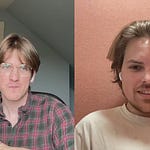
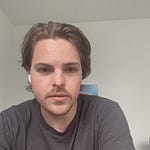
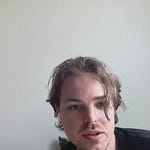
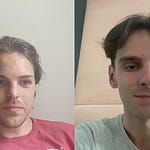

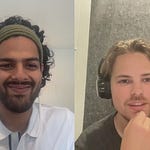

Share this post